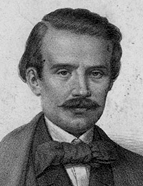

His vast body of work includes numerous articles published in the previously mentioned magazines, showcasing his journalistic talent, as well as countless papers published in Memórias da Academia [Memoirs of the Academy]. In 1852, he anonymously wrote the prologue to Memoria escrita em língua hespanhola por um philo-portuguez e traduzida na língua portugueza por um philo-iberico [Memoir written in Spanish by a pro-Portuguese writer and translated into Portuguese by a pro-Iberian writer] (Lisbon, 1852), a memoir by Sinibaldo de Más, Spain's former ambassador to China, advocating for the peaceful union of Spain and Portugal. At the time, Latino Coelho supported the Iberian union in the form of a unitary, monarchical state. In 1859, he prefaced another Iberianist work, A União Ibérica [The Iberian Union], written by federalist Xisto Câmara, a radical democrat who had gone into exile in Lisbon. However, in a session of the Chamber of Peers in 1869, during which he faced significant criticism, Latino Coelho renounced this youthful ideal in a speech while serving as Minister of the Navy. In Portugal Artístico [Artistic Portugal] (1853), he authored most of the articles that accompanied the corresponding illustrations, written in both French and Portuguese. His writings also include numerous historical tributes, including works dedicated to figures such as D. Frei Francisco de S. Luis, Rodrigo da Fonseca Magalhães, and José Bonifácio de Andrade e Silva. He also published another biography of Almeida Garrett in Panorama. A substantial portion of his extensive body of work, encompassing both books and articles, reflects the ideology of a progressive thinker who, with the establishment of a republican regime, focused on advancing citizenship rights.
